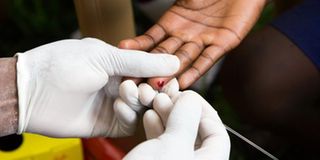Tanzania pushes for 95 percent HIV global testing target

Tanzania had a long way to go for the realisation of the 95 percent aimed at ensuring that at least 95 percent of people living with HIV know their status. PHOTO | SHUTTERSTOCK
What you need to know:
- The Tacaids report shows that the country was doing well in the second and third 95 percent, as more than 95 percent of people who know their HIV status are on treatment, while nearly 95 percent of them had their viral load suppressed.
Dar es Salaam. Health experts have recommended providing education, conducting HIV campaigns and encouraging virus self-testing for Tanzania to achieve the 95-95-95 target by 2025.
The United Nations Programme on HIV/AIDS came up with the 95-95-95 agenda requiring global states to scale up HIV testing to 95, enrol 95 percent of people diagnosed with the disease for treatment, and ensure 95 percent of those subjected to treatment have their viral load suppressed.
However, a recent report by the Tanzania Commission for AIDS (Tacaids) shows that with the 2021-2025 agenda remaining for a few months, the country had a long way to go for the realisation of the 95 percent aimed at ensuring that at least 95 percent of people living with HIV know their status.
The Tacaids report shows that the country was doing well in the second and third 95 percent, as more than 95 percent of people who know their HIV status are on treatment, while nearly 95 percent of them had their viral load suppressed.
According to the document, diagnosis averages 82.7 percent, with males trailing their female counterparts by 78.4 percent and 82.7 percent, respectively.
An average percentage of 97.9 percent of those diagnosed with the disease have been subjected to treatment, while viral load suppression has been recorded in 94.3 percent of them.
Speaking to The Citizen, the director of the Research Initiative Organisation, Mr Michael Mhando, said increased promotion for self-testing and enhancing privacy during the exercise were vital in boosting the number of diagnosed individuals.
“Self-testing reduces shame, fear, and stigma, making it easier for individuals to know the status of their health, therefore enabling them to take appropriate action,” he recommended, saying the move will significantly intensify the fight against HIV.
He added that more education on HIV is needed, especially on the importance of testing to prevent new infections. “We shouldn’t assume people know about the virus and its impact. We need to continue educating them on the importance of testing and the immediate commencement of treatment for those diagnosed with the virus,” he said.
A health consultant and former Medical Association of Tanzania (MAT) President, Dr Elisha Osati, said there was a need for HIV diagnosis campaigns to emphasise the importance of testing among community members.
“We should not focus on specific groups; we need to conduct campaigns that will reach people from all groups so that they can be educated about HIV,” he said.
Tacaids acting executive director, Dr Jerome Kamwela, said the commission is trying to reach various localities, including schools and universities, and educate the youth on the importance of HIV testing.
“We aim to create a more youth-friendly testing environment because it seems like many young people feel uncomfortable getting tested alongside older individuals,” he said over the phone.
“Bringing these services closer to them will encourage an increasing testing trend and promote awareness of proper disease prevention methods,” he added.
Regarding the reasons for men lagging in the virus testing, Mr Kamwela said efforts were underway to reach them in their workplaces.
“Tacaids has been using several initiatives like Mkoba to increase the number of tested individuals at workplaces, including mining and long-distance truck drivers, after being motivated for testing and understanding their health status,” he said.
He said in partnership with non-governmental organisations and religious institutions, Tacaids was actively disseminating education nationwide to combat stigma, which he believes has notably declined.
However, he said stigma still exists against people living with HIV in the country, although in a minimal state.
“Fear of being ostracized keeps some from taking the vital step of getting tested for HIV,” he said.




